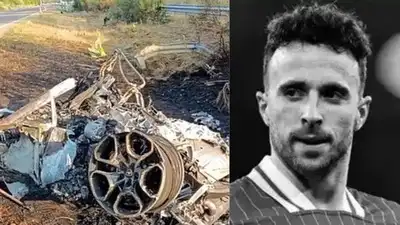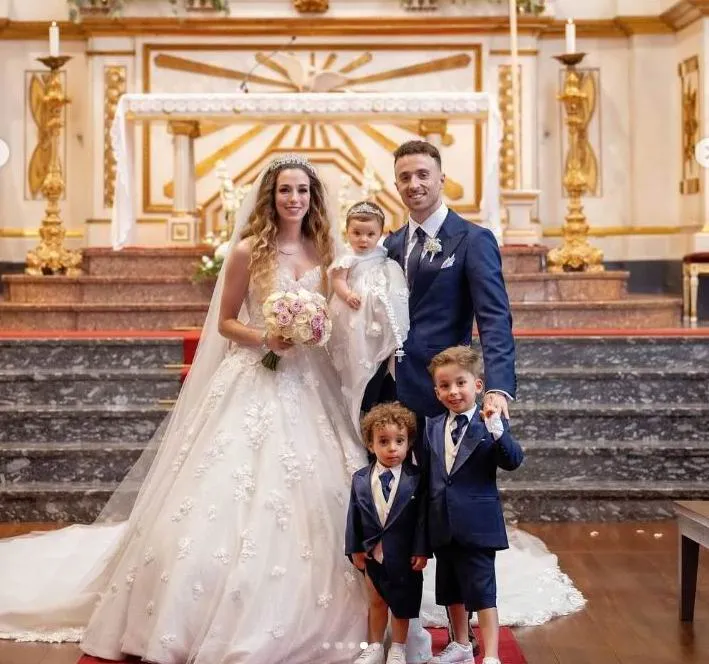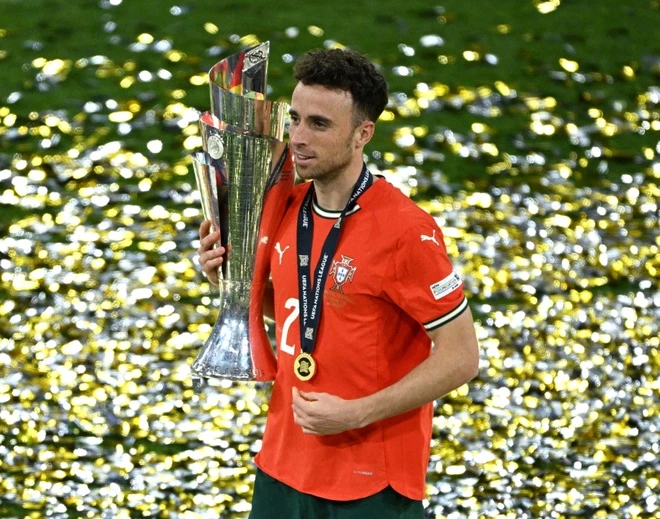The world of football was plunged into mourning on July 3, 2025, when news broke of the untimely death of Liverpool’s beloved forward, Diogo Jota, and his brother, André Silva. The 28-year-old Portuguese star, known for his relentless energy and clinical finishing, met a tragic end in a car accident in northwestern Spain. His journey, driven by a commitment to return to his team for pre-season training, was marked by a series of fateful decisions shaped by medical advice, personal ambition, and the cruel unpredictability of life. This is the story of a footballer whose light shone brightly, only to be extinguished in a moment that has left fans, teammates, and loved ones grappling with grief.
A Star’s Journey and a Medical Crossroads
Diogo Jota was no stranger to overcoming obstacles. Born in Porto, Portugal, he rose from humble beginnings to become a cornerstone of Liverpool’s attack, helping the club secure a Premier League title, an FA Cup, and a League Cup. His career was a testament to hard work, with stints at Paços de Ferreira, Wolverhampton Wanderers, and Porto before his £41 million move to Liverpool in 2020. Jota’s versatility as a winger and center-forward, coupled with his infectious smile, made him a fan favorite. Yet, behind his on-field heroics, he faced physical challenges that would set the stage for his final journey.
In the summer of 2025, Jota underwent lung surgery, a procedure necessitated by a recurring pulmonary issue that had occasionally troubled him. While the surgery was described as minor, it carried significant implications for his travel plans. Medical professionals advised against air travel, citing risks associated with cabin pressure and post-surgical recovery. For a player eager to rejoin his Liverpool teammates for pre-season training, this restriction posed a logistical dilemma. Rather than delay his return, Jota opted for an alternative route: a road trip from his hometown of Porto to the northern Spanish port of Santander, where he would board a ferry to the UK.
The Road to Santander: A Plan Born of Necessity
Jota’s decision to travel by car was not merely a practical one; it reflected his determination to honor his professional commitments. Accompanied by his younger brother, André Silva, a 25-year-old professional footballer for Portuguese second-division club Penafiel, Jota set out in his Lamborghini, a symbol of his success and a vehicle that would tragically become central to the story. The plan was straightforward: drive approximately 300 kilometers from Porto to Santander, catch an overnight ferry to Portsmouth, and then continue by car to Merseyside, where Liverpool’s pre-season training was set to begin on July 7.

The journey was not without its challenges. The A-52 highway, which runs through the province of Zamora near the Portuguese border, is known for its scenic but treacherous stretches. Reports have highlighted the road’s poor condition, with inadequate safety barriers and frequent roadworks contributing to its reputation as one of Spain’s more dangerous routes. For Jota, the decision to travel by road was a calculated risk, driven by his inability to fly and his urgency to return to Liverpool. André, ever supportive, joined his brother, turning the trip into a shared endeavor between two siblings bound by football and family.
A Midnight Tragedy Unfolds
The night of July 2, 2025, was clear, but the A-52 was quiet, its rural stretches illuminated only by the headlights of passing vehicles. Around 12:30 AM, as Jota and André approached the municipality of Cernadilla, their Lamborghini roared past another car in an overtaking maneuver. It was a moment that would change everything. Without warning, one of the vehicle’s tires burst, sending the supercar into a violent skid. The Lamborghini veered off the road, crashing through inadequate guardrails and tumbling into a ditch. The impact was catastrophic, and the car erupted into flames, engulfing the surrounding vegetation in a blaze that illuminated the night.

Emergency services rushed to the scene, but the fire’s intensity and the crash’s severity left little hope. Firefighters battled to extinguish the flames, while paramedics and police assessed the wreckage. Tragically, both Jota and André were pronounced dead at the scene. The cause of the tire blowout remains under investigation, but early reports point to the high speed of the overtaking maneuver and the road’s poor safety features as contributing factors. The loss of two young lives, both with promising careers and deep ties to their community, sent shockwaves through Portugal, Spain, and the global football world.
A Life Cut Short, A Legacy Endured
Diogo Jota’s death came just 11 days after a moment of profound joy: his wedding to longtime partner Rute Cardoso on June 22, 2025. The couple, together since 2012, had three young children, and their wedding in Porto was a celebration of love and commitment. Social media posts from Jota and Cardoso captured the day’s magic, with captions like “Yes, forever” and reflections on a “day we will never forget.” The contrast between this happiness and the tragedy that followed is heart-wrenching, a reminder of life’s fragility.

Jota’s contributions to football were immense. At Liverpool, he scored 65 goals in 182 appearances, earning praise for his work rate and finishing. His international career with Portugal was equally illustrious, with 49 caps and two UEFA Nations League titles. André, though less prominent, was a respected midfielder at Penafiel, known for his perseverance despite a challenging career path. Both brothers embodied the spirit of Portuguese football: gritty, passionate, and deeply human.
The Aftermath: Grief and Reflection
The news of the accident prompted an outpouring of grief. In Liverpool, fans gathered outside Anfield, leaving flowers, scarves, and messages of condolence. The club issued a statement expressing devastation and requesting privacy for the families, teammates, and staff. Across Portugal, tributes poured in from fans, clubs, and public figures, with many calling for improvements to the A-52’s safety standards. The tragedy also sparked discussions about the pressures athletes face to return to training, even under difficult circumstances, and the risks of high-performance vehicles on public roads.
For Rute Cardoso and her children, the loss is unimaginable. Psychological support services have been provided, and the football community has rallied to offer condolences and assistance. Jota’s legacy, however, will endure. His goals, his smile, and his relentless spirit will remain etched in the memories of those who watched him play. André, too, will be remembered for his dedication and the bond he shared with his brother.
A Call to Remember and Reflect
The deaths of Diogo Jota and André Silva are a stark reminder that no one can predict tomorrow. Their story is one of ambition, brotherhood, and a tragic twist of fate. As the football world mourns, it also reflects on the need for safer roads, better support for athletes’ health, and a deeper appreciation for the moments that define a life. Jota’s journey may have ended, but his impact will resonate for years to come, a testament to a star who burned brightly and left an indelible mark.
